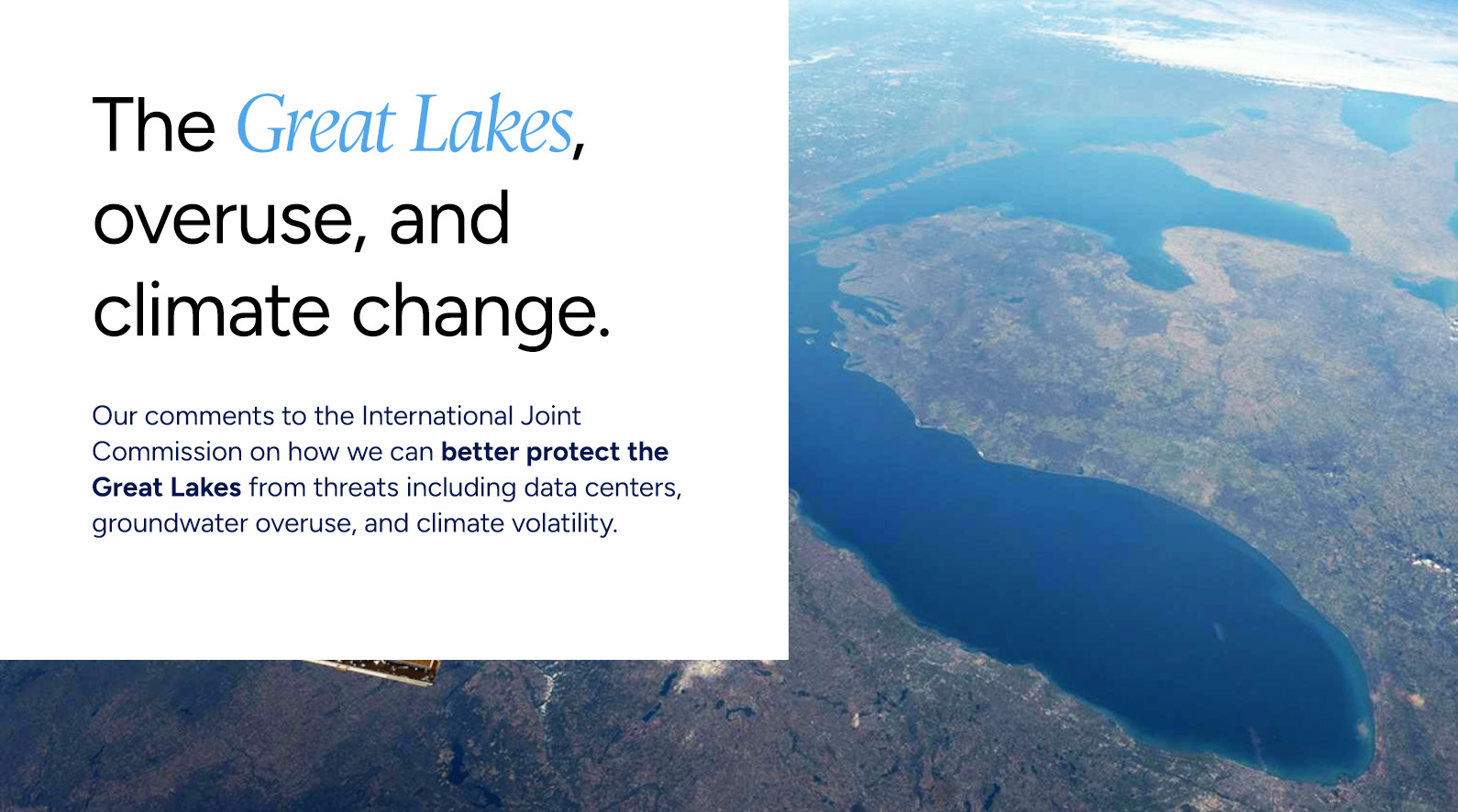
The Great Lakes are the lifeblood of North America, holding nearly one-fifth of the world’s surface freshwater and supplying drinking water to 40 million people. A new report from the International Joint Commission (IJC), its second Draft 10-Year Report on the Protection of the Waters of the Great Lakes, highlights progress as well as new and unprecedented threats—from climate change and groundwater overuse to Big Tech’s rapid expansion of data centers—and offers a series of recommendations for governments to act in concert.
Flow Water Advocates recently submitted public comments (PDF) on the IJC’s draft report and recommendations, urging stronger protections to protect this finite but globally significant freshwater reserve. Specifically, Flow urges the IJC and governments at all levels to:
- Prioritize Indigenous leadership in decision-making.
- Require transparency and accountability for large water users like data centers.
- Strengthen groundwater science, management, and funding.
- Activate and implement the public trust doctrine in Great Lakes governance.
- Restore and expand funding for binational climate science.
Indigenous leadership in Great Lakes governance is essential: Flow commends the report for calling for Indigenous Nations to be recognized as rights holders, not stakeholders. Active indigenous participation, coupled with their knowledge of laws, treaties, and traditional ecological knowledge (TEK), is critical to ensuring the waters are managed with respect for tribal sovereignty and long-term stewardship of these shared waters.
Data centers pose growing risks to our water, energy, land, and climate: The explosion of data centers to power artificial intelligence and cloud computing is transforming the Midwest into “ground zero” for new construction. But this growth comes with steep costs:
- A single hyperscale data center can use 1–5 million gallons of water per day—equivalent to a town of 10,000–50,000 people.
- U.S. data centers already use 17 billion gallons of water annually, a number expected to double or quadruple.
- Most Great Lakes states provide tax breaks to data centers, but do not require water conservation measures.
Even more concerning, water use often goes unreported when centers connect to municipal systems. This loophole leaves policymakers blind to cumulative water impacts. Flow urges governments to require full disclosure of water, energy, and climate impacts before new data centers are sited—and to close gaps in water use reporting.
The Public Trust Doctrine provides a vital legal backstop: While the Great Lakes Compact and related agreements provide important protections, they are not sufficient to address emerging threats like climate volatility and water-thirsty industrial expansion. The public trust doctrine, rooted in centuries of law, affirms that governments hold waters in trust for the benefit of the public. Flow urges the IJC and Great Lakes governments to integrate this legal principle into decision-making by:
- Requiring findings on cumulative impacts before approving major withdrawals.
- Ensuring no privatization or commodification of Great Lakes waters.
- Applying public trust protections to groundwater as well as surface waters.
This doctrine provides a durable backstop to prevent harm, overuse, and privatization before it happens, and holds governments accountable for protecting the water as a commons for current and future generations.
Climate change is already here and continues to accelerate in the Great Lakes: The Lakes are experiencing climate volatility at a faster pace than anticipated: water levels that swing dramatically, ice cover disappearing, droughts increasing, and harmful algal blooms spreading. Extreme weather events have already doubled since the 1990s. And yet, funding for the science the public and policymakers rely on—like NOAA’s Great Lakes research programs—is under threat. To prepare, Flow urges the IJC and the governments to continue to invest in robust science, climate modeling, and groundwater mapping, while ensuring that preparedness planning integrates both traditional ecological knowledge and Western science.
The Great Lakes are at a crossroads. Expanding data centers, intensifying climate extremes, and groundwater stress all converge on a finite resource that 40 million people depend on. Flow’s comments recommend that the IJC and governments act decisively by elevating Indigenous leadership, requiring transparency from Big Tech and other large water users, embedding public trust principles into governance, and investing in the science needed to anticipate and manage climate change risks and impacts. The choices made in this decade will reverberate for generations. In short, by embracing planning, precaution, and shared stewardship, we can ensure the Great Lakes remain healthy, abundant, and protected for the public good.
